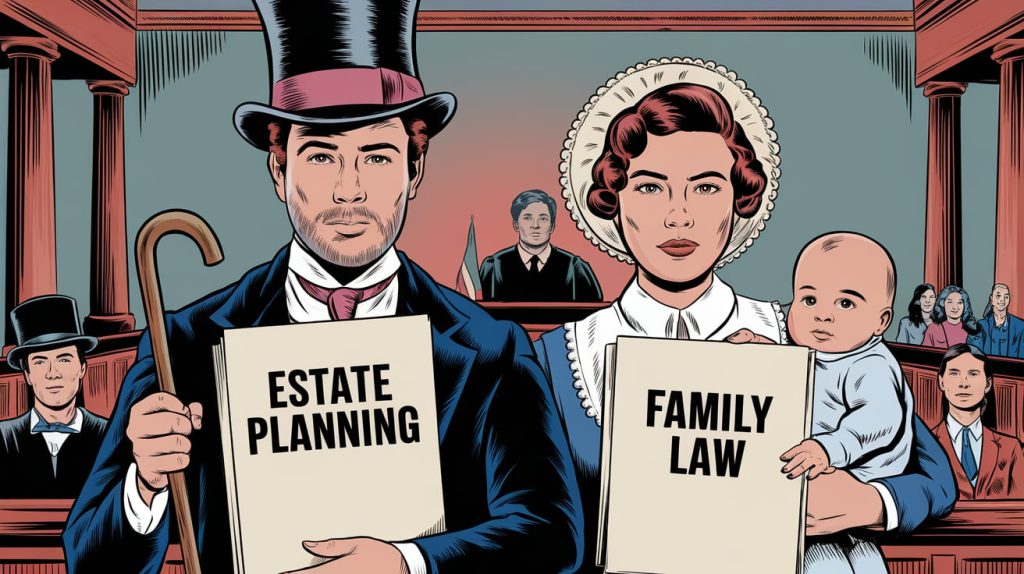The legal landscape in the United States is vast, with distinct areas of law catering to specific needs. Among the most vital are estate planning and family law. While these fields may seem unrelated, both play crucial roles in addressing personal and familial matters. This article provides an in-depth comparison, detailing the legal frameworks, practical applications, and how they influence individuals and families.
What is Estate Planning?
Estate planning is the process of organizing and preparing for the management and distribution of an individual’s assets during their lifetime and after death. It encompasses a variety of legal tools designed to ensure financial security for loved ones and minimize potential disputes.
Key Components of Estate Planning:
- Wills: A legally binding document specifying how assets should be distributed posthumously. Governed by state-specific probate laws, such as those outlined in the Uniform Probate Code (UPC).
- Trusts: Instruments like revocable living trusts allow individuals to bypass probate while maintaining control over asset distribution.
- Powers of Attorney: Legal authority granted to a trusted person to manage financial or medical decisions if the individual becomes incapacitated.
- Healthcare Directives: Also known as living wills, these documents outline medical preferences in situations where one cannot communicate their wishes.
Legal Frameworks:
- Internal Revenue Code (IRC): Governs estate and gift taxes, ensuring compliance with federal tax obligations.
- Uniform Trust Code (UTC): Provides a standardized approach to creating and managing trusts across participating states.
What is Family Law?
Family law focuses on legal matters related to familial relationships, including marriage, divorce, child custody, and adoption. It aims to resolve disputes while safeguarding the rights and welfare of individuals involved.
Core Areas of Family Law:
- Marriage and Divorce: Legal procedures governed by state-specific laws such as the Uniform Marriage and Divorce Act (UMDA).
- Child Custody and Support: Determined under frameworks like the Uniform Child Custody Jurisdiction and Enforcement Act (UCCJEA) and Title IV-D of the Social Security Act.
- Adoption: Regulated by federal and state statutes, ensuring the legal transfer of parental rights.
- Domestic Violence and Protective Orders: Addressed through state-specific laws to protect victims and enforce safety measures.
Legal Frameworks:
- Family and Medical Leave Act (FMLA): Protects employees needing time off for family-related matters.
- Child Support Enforcement Amendments: Establish enforcement mechanisms for child support obligations.
Comparing Estate Planning and Family Law
While estate planning and family law address different aspects of legal practice, they occasionally intersect, such as in divorce cases where asset division involves estate planning tools.
| Aspect | Estate Planning | Family Law |
|---|---|---|
| Primary Objective | Management and distribution of assets | Resolution of familial disputes and relationships |
| Legal Documents | Wills, trusts, powers of attorney, healthcare directives | Divorce decrees, custody agreements, support orders |
| Governing Bodies | Probate courts, tax authorities | Family courts |
| Beneficiaries | Heirs and dependents | Spouses, children, other family members |
When to Consult a Lawyer?
- Estate Planning Lawyer
- If you own significant assets, an estate planning lawyer can help draft a will or establish a trust. They ensure compliance with state-specific laws like the UPC to minimize probate delays and taxes.
- Example: An individual in California may need assistance setting up a living trust to avoid the state’s lengthy probate process.
- Family Law Attorney
- During a divorce or custody dispute, consulting a family lawyer is essential. They guide clients through state-specific requirements, such as equitable distribution laws or parenting plans.
- Example: A couple in Texas undergoing divorce must navigate the state’s community property laws with the help of an attorney.
Intersection of Estate Planning and Family Law
- Divorce and Estate Plans: Divorce necessitates revisiting estate plans to update beneficiaries and powers of attorney.
- Blended Families: Estate planning becomes complex in blended families, requiring specialized legal advice to ensure equitable asset distribution.
- Guardianship Designations: Both fields address the appointment of guardians for minor children, often requiring collaboration between attorneys.
Legal References and Resources
- Federal Laws:
- Internal Revenue Code (IRC) for estate and gift taxes.
- Family and Medical Leave Act (FMLA) for family-related employment protections.
- State Laws:
- Uniform Probate Code (UPC) for estate planning and probate processes.
- Uniform Child Custody Jurisdiction and Enforcement Act (UCCJEA) for child custody matters.
- Judicial Precedents:
- Landmark cases such as Obergefell v. Hodges have influenced family law, while estate planning has been shaped by rulings on trusts and tax law compliance.
Understanding the distinctions and overlaps between estate planning and family law is essential for navigating personal and familial legal challenges. Whether securing your legacy or resolving disputes, consulting the appropriate legal professional ensures compliance with the law and protection of your rights. Proactive legal planning today can save time, money, and emotional stress in the future.

